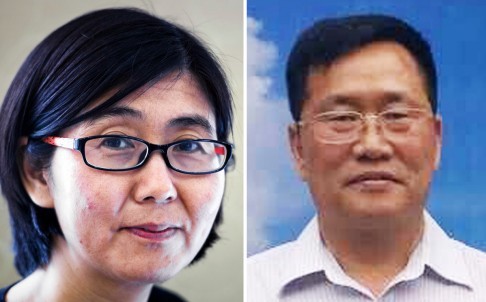China’s dominated headlines recently. News of its stock market crash, news of its influence over the Iran deal, and now, news that its rounding up civil rights attorneys and charging them with as a criminal gang. While these all seem to be signs of a government tightening its grip on its people, we feel a crescendo coming. It’s not a good sign when the government tries to control the markets, the people and the few lawyers who stand up for the weak and unprotected. It would seem that the communist party is acting more desperate than usual with these recent efforts to control. This usually doesn’t work out well. We’ll be watching. Here are some details on the recent arrests for a piece in the International Business Times:
SHANGHAI — Chinese state media say a leading civil rights lawyer, whose company is at the heart of a recent roundup of legal professionals that has attracted international condemnation, has confessed to breaking the law.
Chinese media have accused Zhou Shifeng and his company, Fengrui Law Firm, of being at the core of “a criminal gang” of activists and lawyers seeking to undermine public order by inciting protests inside and outside Chinese courts. However human rights groups have questioned the reported confession, and the United Nations, European Union and a number of governments have criticized the arrests, while activists say the targeting of Fengrui, which has represented many dissidents, civil rights activists and citizens petitioning against the government, is part of an increasingly harsh crackdown on civil society in China.
Over the past 10 days, police have taken a total of 233 lawyers and activists around the country in for questioning, including many lawyers who had signed a petition against the initial detention of Fengrui staff on July 10. Fourteen people, most of them Fengrui employees, remain in detention and have been charged with disturbing public order. The husband of Fengrui lawyer Wang Yu has also been detained, while her 16-year-old son is reported to have been prevented from leaving China to go to study in Australia. Six people are also said to be still missing.
The official Xinhua news agency said Fengrui’s director, Zhou, had admitted that the firm had “violated laws and made serious mistakes.” It also said several other employees had admitted that the company “often hyped and politicized sensitive cases,” to gain prominence and international attention. Xinhua reported the lawyers were accused of repeatedly “making a scene” in order to get ejected from the courtroom, as a “trick to gain sympathy and call attention to cases.”
The authorities have drawn particular attention to the company’s links with Wu Gan, a civil rights activist who was later given a job at Fengrui. Wu first came to prominence online, after carrying out his own investigations into controversial cases: in 2009 he helped prevent a miscarriage of justice against a young woman in central China who had been arrested for murdering a local government official; Wu found and interviewed the woman, Deng Yujiao, and discovered she had stabbed the official in self defense after he and a colleague tried to rape her. After Wu posted an interview with her online, official media reported the story and Deng was eventually spared jail.
Time Magazine looks at another attorney arrested:
“Everyone knows that they have detained Wang Yu because she is an outstanding example of … a human-rights lawyer in China,” attorney Chen Jianggang told Radio Free Asia.
Wang is an attorney at Beijing Fengrui law firm, which appears to be the focal target of the police. Also among the detained is Fengrui lawyer Zhou Shifeng, former counsel to the journalist Zhang Miao, who was imprisoned for nearly nine months after covering Hong Kong’s pro-democracy movement for Die Zeit.
In an article in the South China Morning Post:
on Sunday headlined “Uncovering the dark story of ‘rights defence’.”, spanning two-thirds of its second page, People’s Daily said the Ministry of Public Security launched the operation to “smash a major criminal gang that had used the Beijing Fengrui law firm as a platform since July 2012 to draw attention to sensitive cases, seriously disturbing social order”.
The article said the firm’s director Zhou Shifeng, his assistant Liu Sixin, lawyers Wang Quanzhang, Huang Liqun, Wang Yu and her husband Bao Longjun were in criminal detention for “seriously violating the law”. It did not specify a charge. On the mainland, police can detain suspects for up to 37 days before prosecutors approve their formal arrests.
It said “the criminal gang” comprised Zhou, Wang Yu, Wang Quanzhang, Huang as well as Liu, Bao and high-profile activist Wu Gan, who masterminded many plots in the name of “rights defence, justice and public interest”. It accused them of “colluding with petitioners to disturb social order and to reach their goals with ulterior motives”.
Wu, an online activist nicknamed “Super Vulgar Butcher”, was formally arrested a week ago on charges of “inciting subversion” and “provoking trouble”. He also worked at Fengrui and Wang Yu was his defence lawyer.
People’s Daily said Wu was “a key player” in drawing a huge public outcry over the fatal shooting of an unarmed man, Xu Chunhe, by a policeman in Qingan, Heilongjiang , in May, offering 100,000 yuan (HK$126,000) for any footage showing the incident. Other rights lawyers were accused of involvement. “These lawyers publicly challenged the court … and mobilised troublemakers to rally petitioners … outside the court,” it said. “They are the direct pushers.”
The six people criminally detained were among over 100 lawyers and rights advocates taken away, summoned or detained by police over the weekend. At least three law firms were also searched. Many of the detainees had signed a statement condemning Wang Yu’s disappearance early on Thursday after her electricity was cut and her home broken into.
SOME were taken from their homes in the middle of the night. Others had their offices raided, or were summoned to “take tea” at the local police station—a euphemism for being interrogated. According to Amnesty International, around 120 lawyers, as well as more than 50 support staff, family members and activists, have been rounded up across the country since the pre-dawn hours of July 9th. Many have been released, but as The Economist went to press at least 31 were still missing or were believed to remain in custody.
The round-up has been remarkable for its speed, geographic extent and the number of people targeted. Teng Biao, a Chinese lawyer and activist currently in America, says it includes nearly all of China’s civil-rights lawyers. They are a harassed lot at the best of times, but this is the most concerted police action against them since such lawyers began to emerge in the early 2000s as defenders of the legal rights of ordinary people in cases against the state. In the past few days state media have vilified them, describing them as rabble-rousers seeking “celebrity and money”.
The police have focused particular attention on Fengrui, a law firm in Beijing. It was set up in 2007 and is known for defending dissidents as well as suing on behalf of people forcibly evicted from their homes and victims of miscarried justice. The police have accused some Fengrui staff of being part of a “major criminal gang” whose members stirred up discontent about the government in more than 40 incidents of “public disorder” in the past three years. They cite the case of a “lawful” police shooting in the north-eastern province of Heilongjiang in May, which they accuse Fengrui’s lawyers of “hyping up” through social media and by organising a demonstration against it. Wang Yu, the first lawyer to disappear (her husband and 16-year-old son were taken too), worked on this case.
Civil-rights lawyers in China often publicise disputes because they do not trust the legal system. The judiciary is not independent, judges are often beholden to local interests and the law is not applied even-handedly. Popular sentiment can help to sway court decisions. Since taking office in 2012 Xi Jinping, China’s leader, has stressed the need for the “rule of law”, but has made it clear that he means something different: shoring up the party’s control, not holding it to account. Several years ago the party tolerated civil-rights lawyers. Now it treats them as seditious. Some of those detained recently were warned not to get involved in “sensitive” cases. Veiled threats were made to their families.
Don’t forget to sign up for the newsletter to get the inside scoop!
Follow us on Instagram, twitter and Facebook to join the revolution!






